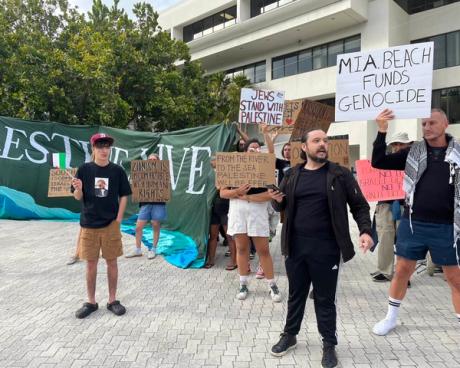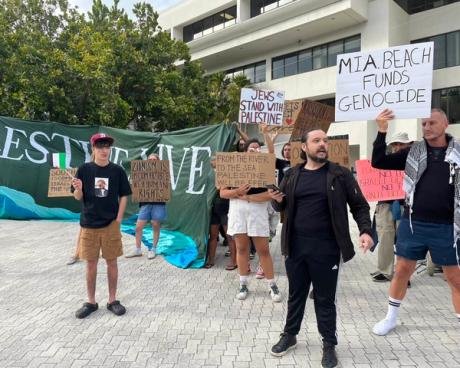
The Miami-based artist Les Gomez-Gonzalez has withdrawn from a Miami exhibition after the gallery insisted they sign an anti-BDS (boycott, divestment, sanctions) statement.
Gomez-Gonzalez had been planning and making work for the group show Ebb & Flow: Exploring the Womanhood Continuum (until 22 February 2025) at the Frank C. Ortis Art Gallery in Pembroke Pines, Florida, for several months when, in late September, they received a vendor registration form that included a note asking them to “affirm that the company does not participate in any boycott of Israel”. The artist, who has a practice grounded in clay and works across mediums including photography and video, said they knew immediately they could not sign the contract.
The clause references Florida Statute 287.135, a law passed in 2011 to restrict state-funded entities from contracting with “scrutinised companies” in Sudan and Iran. It was expanded to include Cuba the following year. In 2016, it was expanded again to restrict state funding for domestic companies participating in a boycott of Israel known as the BDS movement—modeled after South Africa’s Anti-Apartheid Movement and intended to pressure Israel to comply with international law.
It is unclear when exactly language related to this law began appearing on artists’ contracts, but an investigation by the independent newsroom Prism found that a similar clause was included recently on contracts and calls for public-art projects in the Florida communities of Sunrise, Lauderdale Lakes and Key West.
When Gomez-Gonzalez asked to speak with representatives of the Frank to clarify the clause, they were informed that their views were not being directly targeted and that this was a matter of state policy. There have been no reports to date of the law being used to penalise arts institutions, but there may be fear of a crackdown, especially given recent cuts in state arts funding. As a municipal organisation, the Frank was not authorised to give a statement or respond to requests for comment.
“In the end, the only option I had was to either sign the form and be in the exhibition—or not,” Gomez-Gonzalez tells The Art Newspaper. “There weren’t really any alternatives offered.” The artist decided to pull their work from the show and has yet to find another venue to exhibit it.
“It was really disappointing that an alternative wasn’t provided,” they add. “It is the responsibility of the folks who work there to utilise their resources and platform to support their artists and to challenge the statute, committing to ending the genocide in Gaza. It was disheartening to experience this level of institutional complacency and complicity.”
Gomez-Gonzalez did not have any contact with the other artists in Ebb & Flow and was the only one to withdraw their work from the show. It is unclear if other artists have withheld their work due to the statute in similar contracts across Florida.
Several prominent Miami art institutions, including the residency programme Oolite Arts and the Institute of Contemporary Art, have faced censorship scandals related to the Israel-Hamas war. But even before the current conflict, Florida had already been at the forefront of anti-BDS legislation. In 2015, the municipality of Bal Harbor became the first in the nation to pass the anti-BDS laws that have become a basis for similar restrictions across the US.
More than 30 states have now passed legislation or executive orders similar to the Florida statute. The American Civil Liberties Union has said that the laws “are not designed to prevent discrimination. In fact, they’re designed to discriminate against disfavored political expression.” In July, a dozen Republican US senators introduced a bill that would prohibit federal contracts with organisations boycotting Israel.
“It is important that artists are supported, that cultural institutions are standing by their mission statements to uplift marginalised communities and initiate cultural change,” Gomez-Gonzalez says. “It’s not okay that these anti-BDS laws are being written into cultural practitioners’ contracts across the US.”
Gomez-Gonzalez posted screenshots from their letter of withdrawal to the Frank on Instagram in November, and has received messages of support and feedback from people locally, out of state and abroad.
“Folks have been surprised and unsettled to learn that the statute was on a vendor registration form for an art-exhibition contract,” Gomez-Gonzalez says. “This happened to me, but it’s not about me. This affects us all. This is about how the US is establishing censorship laws against those standing in solidarity with Palestine. We are being put in a position where, in order to be exhibited and paid, we have to agree to this.”










